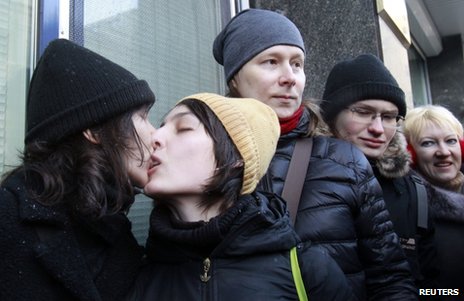The Russian parliament has backed a ban on the promotion of homosexuality among children in its first reading, amid scuffles on the street outside.

Police made arrests outside the State Duma in Moscow after gay rights supporters planning a “kiss-in” were assaulted by opponents.
The bill echoes laws passed by Russian cities such as St Petersburg.
Human rights campaigner Lyudmila Alexeyeva said its real aim was to “curb the rights of sexual minorities”.
The bill faces two more readings in the State Duma, after which it must be approved by the upper house (Federation Council) and President Vladimir Putin before it can become law.
If passed, it would mean that across Russia events promoting gay rights would be banned and the organisers fined, the BBC’s Steve Rosenberg reports from Moscow.
Last year, Moscow’s top court upheld a ban on gay pride marches in the Russian capital, effectively prohibiting them for the next 100 years.
The European Court of Human Rights has fined Russia for banning such parades in Moscow.
Homosexuality was decriminalised in Russia in 1993.
‘No definition’
On Friday, police were seen making arrests after at least one man assaulted gay rights supporters outside the Duma.
Images from the scene suggest that both supporters and opponents, believed to be militant Russian Orthodox Christians, were detained.
Under the new bill, private individuals promoting “homosexual behaviour among minors” in Russia face fines of up to 5,000 roubles (£105; 124 euros; $166) while officials risk paying 10 times that amount. Businesses and schools could be fined up to 500,000 roubles.
Yelena Kostyuchenko, a gay rights campaigner and journalist with the Russian newspaper Novaya Gazeta, told AP news agency: “The law absolutely does not define what gay propaganda is and the reasons are understandable because gay propaganda does not exist.
“In that respect, any information on, as the law puts it, ‘equal values of traditional and unorthodox marital relations’ is considered ‘gay propaganda’.”



